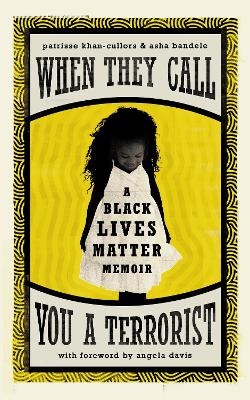The phrase "When They Call You A Terrorist" refers to two episodes in the author's life:
- When Black Lives Matter is referred to as a terrorist group by people who oppose them
- When her mentally ill older brother was charged with terrorism for yelling at a person during a traffic accident
This memoir focuses more on her life leading up to the founding of Black Lives Matter than the aftermath. It tells the story of living in a community that is very heavily policed. When her brother starts showing signs of mental illness his interactions with the police increase. He is taken away and no one is able to find out where he is for months despite constant searching. He isn't treated but just medicated to keep him quiet. He is repeatedly beaten by the police.
I immediately compare this to police treatment of my mentally ill step daughter. She's 14. She has been repeatedly restrained by the police both at schools and at home because of her violence. She has sent adults to the hospital. She has destroyed property. The police will not ALLOW her to be charged with a crime despite multiple requests because "she has a diagnosis." Wanna guess the other differences between her and the author's brother besides access to healthcare to get a diagnosis? Yeah, she's white and lives in an affluent suburb.
I'm not sure how so many white people can continue to think that unequal policing doesn't exist. Even if you aren't involved in a situation that highlights it, so many videos exist. It has to be just willful ignorance to deny the evidence.
The author helped organize a bus trip into Ferguson after Mike Brown's death. A church was offered as a staging place for the 600 people coming in. I thought about that for a while. My brother works at a church that would be perfect for that sort of thing. It is right off the interstate. It has a huge parking lot that could hold a lot of buses. There is a school attached so maybe there are locker rooms so people could shower. Then I laughed and laughed. I can't imagine a white majority church EVER opening their doors to a protest group. They'd have to fight about it in committee and through the church gossip networks for months before they could even begin to make a highly contested decision. Then the pastor would be fired.
My mental tangents aside, this book is ultimately about the power of love and what it looks like to try to live out that love in the real world. It is a short, lyrical book that can help open people's eyes to the needs in communities that have adversarial relationships with police.This review was originally posted on Based On A True Story
